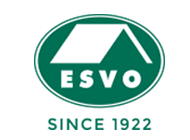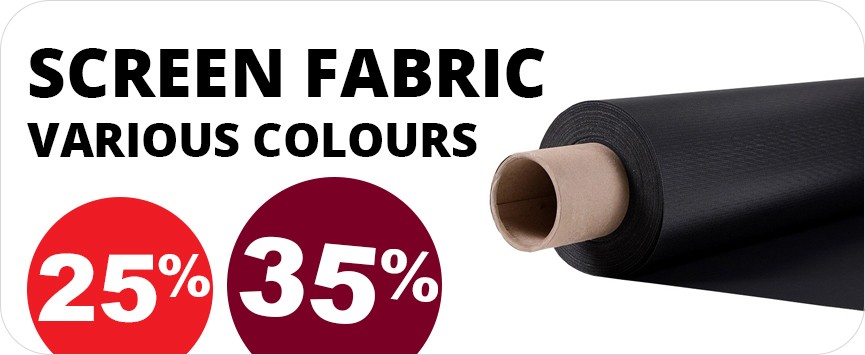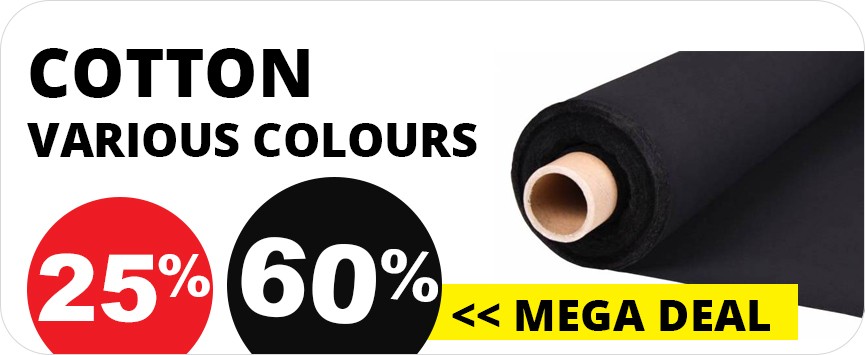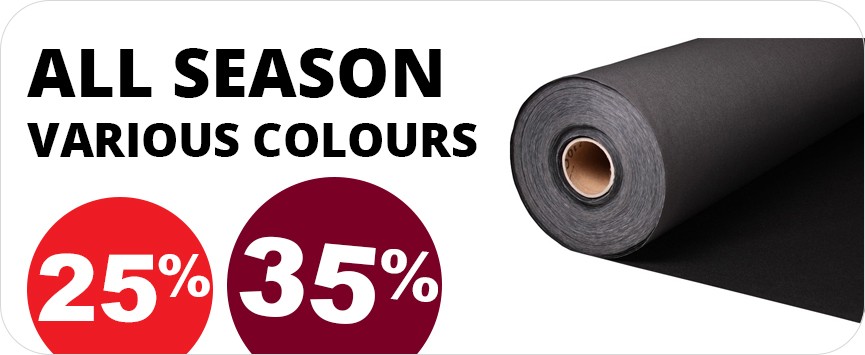Ecohemp. Tent fabric from organic cotton, hemp and recycled polyester
ECOHEMP: Tent fabric by the metre made from organic cotton, hemp and recycled polyester. An absolutely sustainable textile innovation with minimal impact on the environment.
The unique eco hemp from the world's best tent canvas weaver in constant and consistent premium quality TenCate is characterised by very special properties:
- Unique composition - 50% recycled polyester, 30% organic cotton, 20% hemp
- Breathable - cool in summer, warm in cold/freezing weather
- Moisture regulating - rot & fungus resistant
- Good waterproofing - functionally high water column of 30 cm (17 cm is normal)
- Extremely strong - much stronger than cotton
- Relatively light weight - 280 g/m²
- Practical colour fastness - colour fastness standard ≥ 4 (ISO standard 105 B04)
SCROLL DOWN TO SEE OUR AVAILABLE COLOURS BY THE METRE
Sustainable eco-friendly tent fabric with unique canvas properties
TenCate EcoHemp is a unique blend of hemp, organic cotton and recycled polyester: 100% eco-friendly! The ingredient in this tent canvas, hemp, has special properties. Hemp grows under particularly easy conditions. It requires little water during growth and further processing and needs little or no crop protection. In addition, it has similar breathable and moisture-regulating properties as cotton. An additive is needed to make the fabric particularly strong. Polyester is the most commonly used raw material in the camping industry because it is easy to produce and very strong in relation to its weight. To reduce the global impact of polyester use, recycled polyester is increasingly being used. In the meantime, a yarn made from recycled plastic has been developed, in which old fishing nets, for example, have been processed. These are of such good quality that they can also be used as tent material. By using recycled polyester, the environment is relieved and the hemp fabric is strengthened to enable the tents to last for a long time.
Finally, a limited amount of organic cotton is added. This gives you the ideal mix of comfort, durability and quality. Organic cotton is grown entirely organically, using only natural pesticides.
The use of these raw materials in TenCate EcoHemp has led to a significant reduction in the carbon footprint, lower energy costs and savings in water consumption throughout the production process.
TenCate EcoHemp is woven in accordance with the strict regulations of the Organic Content Standard (OCS) and the Global Recycling Standard (GRS). This highly eco-friendly tent fabric is strong, breathable, rainwaterproof, rot-proof and fungus-resistant. It is ideal for pyramid and tunnel tents, trailer tents and glamping tents.
Are you interested in other durable eco tent fabrics or tent canvas?
After reading all the above benefits of Ecohemp tent fabrics, you might think we've found the holy grail. And yes, we have. But we are also working on developing recycled fabrics and 100% organic cotton tent canvas. Are you curious about the rest of our range of eco-friendly tent fabrics? Then contact [email protected] directly to discuss this in more detail. Always welcome!
Yours sincerely,
the ESVO team
More background information on hemp fabric sec
When you think of hemp, you probably don't think of fashionable trousers or dresses. Hemp is often confused with weed or marijuana.
But hemp fabric can also be made into tent fabric, with a whole range of benefits. Not only for the buyer of this innovative tent fabric, but also for the environment! In the information box below, we present the properties and advantages of hemp fabric.
The fibres of hemp fabric are 10 to 10 times stronger than cotton. This makes hemp fabric very durable and long-lasting. Hemp feels soft to the touch, falls smoothly and wears airy. It is stronger, wears out less quickly and absorbs fewer odours.
A brief history of hemp as a textile fabric
The use of hemp fabric to make clothing goes back thousands of years. Research shows that hemp was used as early as 8,000 years before Christ.
The use of hemp in other forms is not new either. In China, for example, the plant was used to make paper as early as 700 AD. A more recent example: Columbus used hemp on his ships, and even the first Levi's were made from hemp denim.
From legal to illegal and back again - hemp was one of the most popular crops in the United States for a long time. That was until the plant was confused with its narcotic brother and the cultivation of hemp became illegal. Strange, especially when you consider that Jefferson and Washington were both hemp farmers and even the American Declaration of Independence was written on hemp paper.
Nowadays, the cultivation of hemp is slowly being legalised again in America. They are also discovering the many benefits of hemp, especially its use as fabric!
The ecological advantages of hemp fabric
The environment is becoming more and more important. People are concerned about the products they buy, and so clothing labels are being scrutinised more and more. However, not every label tells the whole truth. Some are even downright misleading. Take organic cotton, for example. This is often seen as an environmentally friendly fabric, but this is not always the case. On the contrary. Cotton is one of the most environmentally damaging crops. A lot of land is needed and many chemicals are added to keep the product "good". Hemp fabric, on the other hand, is extremely environmentally friendly. The organic fibres are 100% recyclable. But the production process of hemp fibre is also very sustainable, especially compared to other textiles.
Hemp grows very quickly and produces more fibres per hectare than any other source. Up to 250% more fibres than cotton on the same area! In addition, hemp does not deplete the soil. The plants leave their leaves behind, which keeps the soil fertile and maintains moisture. In addition, hemp production requires far less water than cotton production. Only one/twenty! Often a little rain now and then is enough.
General properties of hemp fabric
Hemp fabric offers all the warmth and softness of a natural textile. But super durable! Thanks to their long and strong fibre structure, hemp textiles can withstand harsh conditions. Weather, work or everyday life don't stand a chance. Hemp fibres absorb moisture quickly, dry fast and are breathable. For this reason, it keeps you cool in summer and warm in winter. Another advantage? Textiles made of hemp are naturally antibacterial. So if you wear hemp clothing, you don't have to worry about bad odours getting into the fabric.



